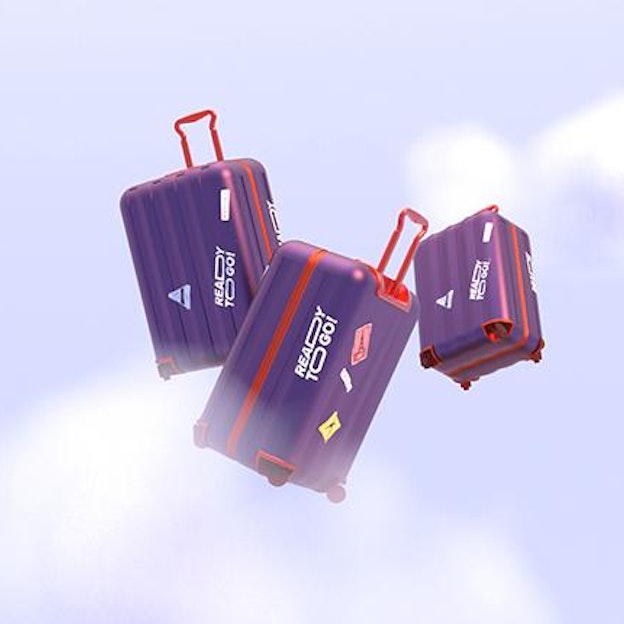Reasons to feel greater confidence in 2022
The world is opening up again as restrictions are eased. US travelers, for example (especially the 66% of whom are fully vaccinated) can now visit almost all Asian and European countries, and even popular destinations such as Australia, New Zealand, Israel, and Morocco which were fully closed to visitors for extended periods.
And customers are ready to go. People are looking to make up for lost time…and lost trips. A study of high-income regular travelers, conducted by Amex, found that 86% of respondents expect to spend more on travel in 2022. What’s more, bookings in some places are up 35% in 2022 compared to 2019.
These are the reasons for optimism. However, with tighter budgets and the lingering possibility of future disruption, the current mindset among most marketers in the travel industry seems to be positive but pragmatic. Digital ad campaigns are an essential investment in order to make the most of the current rise in opportunities, but spending wisely is the key. The watchwords are marketing budget efficiency, flexibility, and agility.
Effective display retargeting campaigns
Campaigns are ready to go. After pausing business for an extended period of time, travel companies are strengthening digital ad campaigns. The most successful approach is something of a paradox: it’s both wide and narrow at the same time.
Wide means utilizing all possible sources of high-quality traffic, combining SEM, Metasearch, prospecting, and retargeting to cover as much ground as possible.
However, it’s not good business to just burn through the budget; ads are only truly effective if they convert–and that means narrowing the search. Retargeting ads, in particular, will have a similar focus to SEM and Metasearch and will target people who are clearly interested in a trip and ready to book.
RTB House uses Deep Learning AI algorithms to harness data from every touchpoint and understand where each user is in their trip-booking journey. Building an audience in real-time and making personalized recommendations to each user means you are still going “wide” and capturing a big audience, but are also showing each person in that huge group something that feels unique to them.
Multi-device travel searches and cross-platform targeting
Travel is a truly digital domain. 90% of people do research online, with the vast majority spending around 4 weeks on sites like Tripadvisor before booking. And while 80% do abandon a booking at some point, that same number will eventually convert and book online.
When we think “digital”, we need to remember that travel is way ahead of the curve and still going on all channels. Even though mobile conversion rates are almost 3.5 times lower than those on desktop, 10% more OTA gross bookings are now transacted on mobile than before the pandemic.
Effective marketing campaigns for OTAs need to treat desktop and mobile users as near equals, understanding that users from all stages of the funnel can be on any device. In-app campaigns should be front and center in your strategy as you look to drive results across platforms.
6 top tips for OTAs to run more effective marketing campaigns
Be agile: Set flexible goals but also utilize campaigns that can be switched on and off easily as you react in real-time to changing situations.
Pay for effects: With restricted budgets, you need to show the effectiveness of ad spend. A CPB or iROAS payment model allows you to prove the value of every dollar spent.
Personalize content: Your ad campaigns should complement your brand and should reach directly to individual customers with hyper-personalized recommendations.
Use your data: With so many digital touchpoints, you certainly have the data to create ads that speak to individual users, instead of just serving them generic content. Leverage Deep Learning AI algorithms to get the most from your data.
Be future-ready: OTAs are adapting to the new normal, but there is more change to come. Choose ad partners right now that are best prepared for 2023 and the end of third-party cookies.
Test the waters: You don’t need to go all-in with a new retargeter. Choose a partner and then run test campaigns or work in a multiple retargeting model. Measure the effects and then assess which operational model works best for your OTA.
Working with travel industry experts
We are ready to go. At RTB House, we’re running 70+ active campaigns for travel businesses in May 2022, with an average ROAS above 14.5. The results come from our superior technology but also because we have dedicated domain experts who work with online travel businesses. For example, we helped Flyin, the number one online travel agency in Saudi Arabia, to achieve a 23% increase in conversion rates and 33% higher retention during our re-engagement campaign. What’s more, crucially for their business, 9 out 10 re-engaged users were new potential buyers.
Trivago says of our partnership: “RTB House developed a system that ensures security and confidentiality of user data. It allows us to optimize toward generating hotel bookings and reservations. We see constant improvement in our campaigns.”
As the world opens up to travel, let’s take your ad campaigns to new places.
For more information about OTAs marketing, please get in touch.
